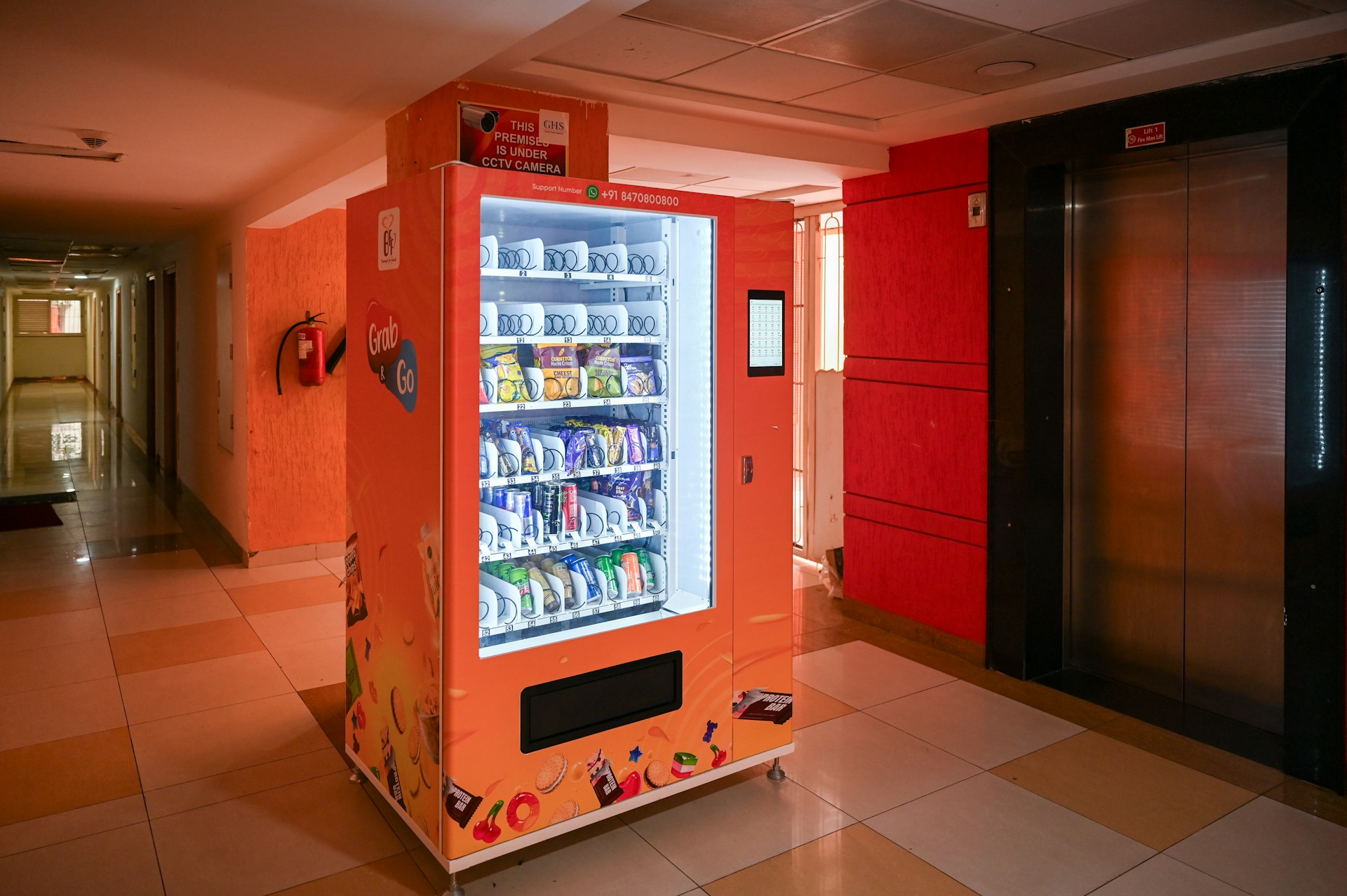Providing modern, convenient amenities is key to attracting and retaining residents. One often-overlooked feature that significantly boosts tenant satisfaction is an on-site vending machine. But not just any machine will do. Choosing the best vending machines for apartments requires careful consideration of size, function, and return on investment.
This guide will walk you through the top models, essential features, and key insights to help you select the perfect vending machine options for apartments for your residential building.
Understanding the Need for Vending Machines in Apartments
Installing a vending machine in your apartment complex is more than just a convenience; it's a strategic amenity that benefits both residents and management
- 24/7 Resident Convenience: Vending machines provide immediate, round-the-clock access to snacks, drinks, and even essentials. This eliminates the need for residents to make inconvenient trips to a store, offering a solution for late-night cravings, quick lunches, or forgotten items.
- A Source of Passive Revenue: For building management and owners, these machines represent a valuable revenue stream. The profit from sales provides a direct return on investment, helping to offset operational costs or fund other community improvements, turning unused square footage into a profitable asset.
- A Competitive Amenity: In a competitive rental market, unique amenities make a property stand out. A well-placed, modern vending machine enhances the perceived value of the complex, attracting potential tenants and contributing to higher retention rates by increasing overall resident satisfaction.
- Fostering a Sense of Community: Placed in common areas like lobbies or laundry rooms, vending machines naturally create micro-hubs of activity. They encourage brief social interactions among residents, fostering a more connected and engaged community atmosphere within the building
Key Features to Look for in Apartment Vending Machines
When shopping for apartment vending machines, prioritize these essential features to ensure you get a model that fits your space and needs.
- Compact Size and Slim Profile: Space is a premium in apartment common areas. Prioritize machines with a slimline or countertop design that can fit snugly into lobbies, laundry rooms, or hallways without obstructing foot traffic or violating fire codes.
- High Energy Efficiency: Since the machine will run continuously, an ENERGY STAR® rating is crucial. This certification ensures lower electricity consumption, protecting your profit margin by keeping operational costs to a minimum.
- Modern Payment Systems: To maximize sales and cater to modern preferences, a machine must offer cashless payment options. Look for integrated readers that accept credit/debit cards and mobile wallets (like Apple Pay or Google Pay) in addition to traditional cash acceptors.
- Adaptable Product Capacity: The best machines offer flexible shelving and adjustable spirals to hold a wide variety of product sizes—from small chips and candy bars to larger bottled drinks and healthy snacks. This versatility allows you to tailor your product mix to resident demand.
- Durability and Security: The machine must be built to withstand public use. Look for robust metal construction, durable coin mechanisms, and a high-quality locking system to prevent tampering and vandalism, ensuring your investment is protected.
- Ease of Maintenance: Choose a model designed for easy servicing. Features like front-facing access, tool-free shelving removal, and a simple interface for tracking sales data make the tasks of restocking, cleaning, and managing inventory much more efficient.
Top Vending Machine Models for Apartments
Selecting the right model is critical for success in a residential setting. Here are our top picks for apartment vending machines, chosen for their blend of size, features, and reliability.
1. XYZ Vending Compact Snack & Drink Combo
This all-in-one unit combines snack and beverage vending in a single space-saving footprint, ideal for apartment lobbies or common rooms. Its 40-inch width and 72-inch height allow it to fit comfortably in tight spaces while offering 120 snack and 120 drink capacities. The energy-efficient compressor reduces electricity costs, and the standard multi-price capability allows for flexible pricing strategies.
- Pros: Dual functionality, compact design, ENERGY STAR rated, accepts cashless payments
- Cons: Smaller capacity than standalone machines, higher initial cost than basic models
- Unique Selling Point: Combines full snack and cold drink capabilities in one machine without requiring extra floor space
- Customer Feedback: Property managers report 95% tenant satisfaction and 30% higher revenue compared to separate machine
2. NutriFresh Healthy Options Refrigerated Machine
Specifically designed for fresh and healthy food options, this glass-front refrigerated machine features precise temperature control and specialized shelving for perishable items. Its LED lighting enhances product visibility, and the humidity-controlled environment maintains food freshness for extended periods.
- Pros:
- Perfect for yogurt, salads, sandwiches, and fresh fruit
- Attractive glass-front merchandising
- Digital temperature monitoring
- Health-conscious tenant appeal
- Cons:
- Requires more frequent restocking
- Higher product cost
- Limited to refrigerated items only
- Expert Opinion: Nutritionists recommend this model for properties seeking to promote wellness initiatives and differentiate their amenities package
3. VendPro SpaceSaver Snack Only Unit
This ultra-compact snack machine stands just 58 inches tall and 32 inches wide, making it perfect for small laundry rooms or hallway installations. Despite its small size, it holds up to 150 items across 5 adjustable shelves and features a durable metal construction.
- Pros:
- Minimal space requirements
- Low energy consumption
- Easy to relocate
- Affordable pricing
- Cons:
- Snack items only
- Limited capacity for high-demand locations
- Unique Selling Point: The smallest full-function snack machine available, specifically engineered for space-constrained environments typical in residential settings
4. BevMax Residential Drink Specialist
Designed exclusively for beverage service, this machine features a stunning glass front display and can accommodate cans, bottles, and larger containers up to 20 ounces. Its advanced spiral mechanism ensures reliable vending and minimizes product jams.
- Pros:
- Excellent product visibility
- Handles multiple container sizes
- High-capacity cooling system
- Durable stainless steel exterior
- Cons:
- Beverages only
- Requires more depth than other models
- Customer Feedback: Tenants appreciate the wide selection options, with many noting they particularly value the availability of water and sugar-free choices at all hours
Maintenance and Management of Vending Machines
A well-maintained machine is a profitable one. Proper upkeep ensures resident satisfaction and protects your investment.
- Regular Restocking: Establish a consistent schedule based on sales data to ensure popular items are never out of stock.
- Routine Cleaning: Wipe down the exterior daily and schedule a deep clean of the interior and mechanisms monthly to maintain hygiene and appearance.
- Cash Collection & Management: Empty the cash box regularly and keep accurate records for financial tracking.
- Technical Troubleshooting: Have a contact for technical support or a basic troubleshooting guide for common issues like vend errors or payment reader glitches. For more details, see our guide on vending machine maintenance tips.
Cost Considerations and ROI for Apartment Vending Machines
Understanding the financials is crucial before making a purchase.
- Initial Investment: Prices for new apartment vending machines can range from $3,000 to $6,000+, depending on features and size. Leasing or buying a quality refurbished unit can lower the upfront cost.
- Operational Costs: Factor in electricity, potential credit card processing fees (2-3% per transaction), and the cost of goods sold.
- Calculating ROI: Track gross sales and subtract the cost of inventory and operational expenses. Profit margins on vended items are typically high (40-60%). A well-placed machine can often pay for itself within 12-18 months. To understand this process in depth, read our article on how to calculate ROI on vending machines.
- Legal Considerations: Always check local regulations and health codes, especially for machines selling perishable items. Ensure you have the proper electrical outlet (dedicated circuit is best) and consider liability insurance
FAQs
1. What are the benefits of having vending machines in apartment complexes?
They offer 24/7 convenience for residents, generate passive rental income for management, enhance the property's appeal as a modern amenity, and can foster community interaction in common areas.
2. What features should I look for in a vending machine for apartments?
Prioritize a compact size, energy efficiency (ENERGY STAR®), cashless payment capability, flexible product capacity, and durable, secure construction. These features ensure it fits, saves costs, meets tenant expectations, and is secure.
3. Which vending machine models are best suited for residential use?
Top models include the space-saving VendMax SlimLine Combo, the incredibly durable Automatic Products 113 Snackshop, and the premium Healthy You YouVend for fresh food. Choose based on your space, budget, and resident needs.
4. How can building management maintain and manage vending machines effectively?
Manage effectively by creating a regular schedule for restocking popular items, cleaning the machine interior/exterior, collecting cash, and troubleshooting minor issues. For complex problems, have a technician's contact information readily available.
5. What are the costs associated with vending machines in apartment settings?
Costs include the initial machine purchase ($3,000-$6,000+), electricity to run it, the cost of goods for inventory, and potential transaction fees from credit card processing. Leasing is a lower-upfront-cost alternative.
6. How can vending machines provide a good ROI for apartment owners?
They provide ROI through direct profit from sales, often with 40-60% margins. This creates a passive income stream that can offset costs and potentially pay for the machine itself within 12-18 months in a good location.
7. Are there any specific legal considerations for installing vending machines in apartments?
Check local business licensing requirements and health codes, especially for perishable items. Ensure you have proper electrical hookups and consider liability insurance. It's also crucial to place the machine without violating fire codes.
Conclusion: A Valuable Investment for Modern Living
Installing the right vending machine is a strategic decision that enhances tenant convenience and creates a valuable revenue stream. By prioritizing compact size, energy efficiency, and modern features, you can select a model that delivers an excellent return on investment while elevating your property's amenities. Careful selection and simple maintenance will ensure your vending machine becomes a profitable and appreciated feature of your apartment community for years to come.










